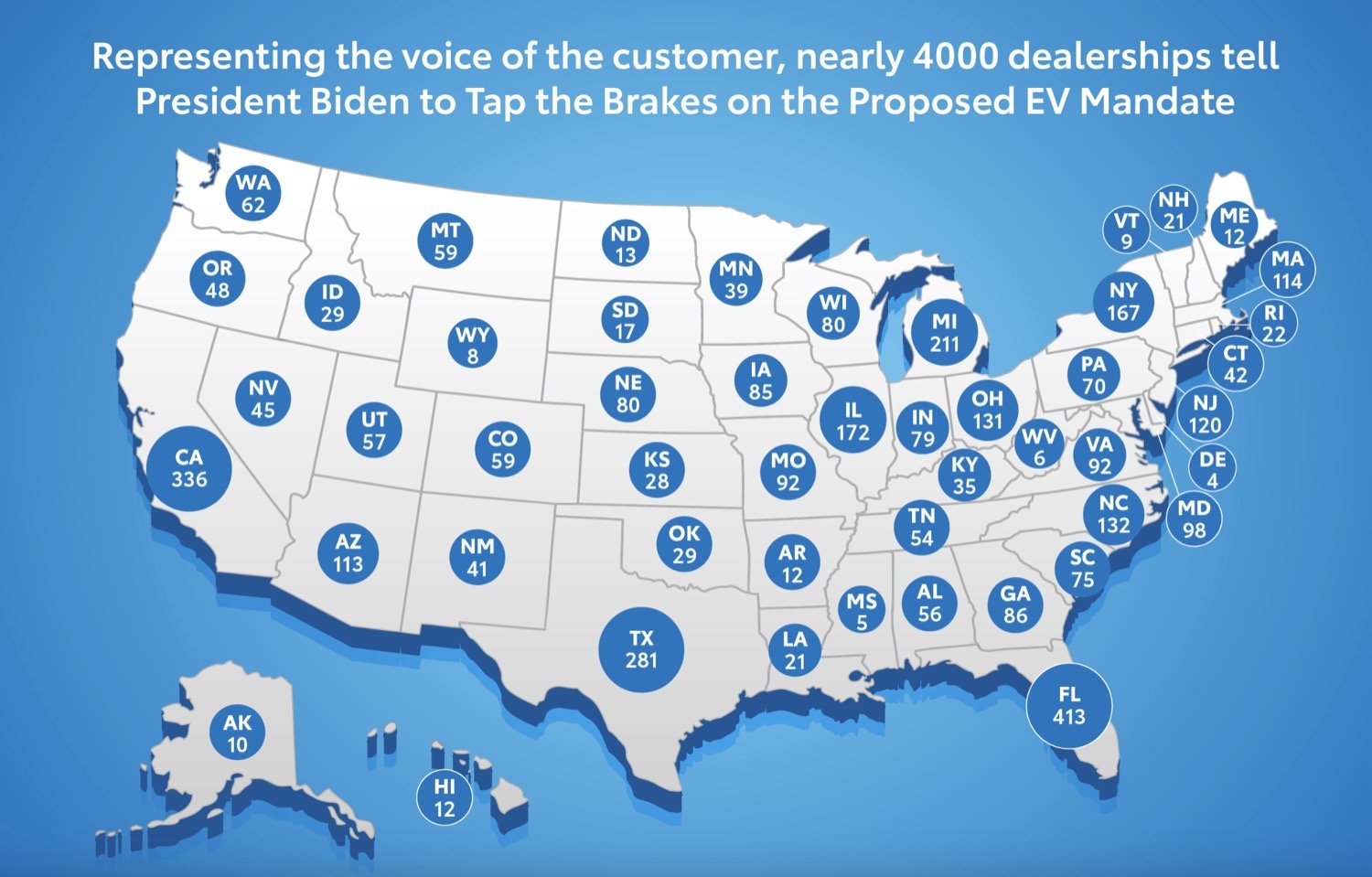EV Mandate Opposition: Car Dealerships Push Back

Table of Contents
Financial Investments and Infrastructure Concerns
The transition to an EV-centric market presents immense financial challenges for car dealerships. The cost of adapting to the new landscape is substantial, potentially jeopardizing the viability of many dealerships, particularly smaller ones. This financial burden stems from several key factors:
-
High Upfront Costs: Upgrading dealerships to handle EV sales and servicing requires significant investment. This includes installing charging stations, acquiring specialized tools for EV maintenance and repair, and modifying existing service bays to accommodate the unique needs of electric vehicles. The costs associated with these upgrades can run into hundreds of thousands, even millions, of dollars depending on the size and location of the dealership.
-
Lack of Government Support: Many dealerships argue that government support for infrastructure development and dealer transition programs is insufficient. While some incentives exist, they often fall short of covering the complete cost of upgrading facilities and training staff. This gap leaves many dealerships struggling to finance the necessary changes.
-
Employee Training: EV maintenance and repair require specialized skills and knowledge that differ significantly from those needed to service gasoline-powered vehicles. Dealerships must invest heavily in training their employees on EV technology, diagnostic procedures, and safety protocols. This training represents a significant expense, both in terms of direct costs and lost productivity during the training period.
-
Return on Investment Uncertainty: The significant financial investment required to adapt to the EV mandate creates uncertainty about the return on investment. The speed of EV adoption, the profitability of EV servicing, and the potential impact of competition all contribute to the risk associated with these investments. Dealerships need assurances that their investments will yield a positive return before committing to these substantial upgrades.
Consumer Demand and Market Readiness
While the EV market is growing, concerns remain about its overall readiness for a rapid, mandated transition. Several factors contribute to dealerships' skepticism regarding consumer demand and market preparedness:
-
Insufficient Consumer Demand: Consumer demand for EVs varies significantly across geographic regions and demographics. In certain areas, the demand may be insufficient to justify the substantial investments required to upgrade dealerships to handle EV sales and service.
-
Range Anxiety and Charging Infrastructure: Range anxiety—the fear of running out of battery power before reaching a charging station—remains a major barrier to consumer adoption. The limited availability of reliable and convenient public charging infrastructure further exacerbates this concern. Until a robust charging network is in place, consumer confidence in EVs will remain limited.
-
Higher Upfront Costs: The higher initial purchase price of EVs compared to gasoline-powered vehicles remains a significant hurdle for many potential buyers. This price difference can be a significant barrier, especially for budget-conscious consumers.
-
Negative Consumer Perception: Negative perceptions regarding EV maintenance and repair costs can deter potential buyers. Some consumers believe that EV repairs are more expensive and complex than those for gasoline cars, leading to hesitancy in purchasing an EV.
The Impact on Dealer Networks and Employment
The transition to EVs poses significant risks to the existing dealer network and its workforce:
-
Potential Job Losses: Reduced demand for gasoline vehicles could lead to job losses among dealership staff, including salespeople, service technicians, and parts personnel. This is particularly concerning for smaller dealerships that rely heavily on the sales and servicing of gasoline cars.
-
Workforce Displacement: The need for specialized skills in EV repair and maintenance could displace existing technicians lacking the necessary expertise. Retraining existing technicians is crucial, but it requires substantial investment and time.
-
Smaller Dealership Viability: Smaller dealerships might find it particularly challenging to adapt to the EV mandate due to the substantial financial burden of upgrading their facilities and retraining their staff. This could lead to the closure of smaller dealerships, negatively impacting local economies and the overall dealer network.
-
Economic Impact: The automotive industry plays a significant role in many communities. Job losses within the dealership network could have a ripple effect, harming local economies dependent on the automotive sector.
Alternative Solutions and Policy Recommendations
A more measured and collaborative approach is needed to address the concerns raised by car dealerships and ensure a smooth transition to electric vehicles. This includes:
-
Phased Approach: Implementing a phased approach to EV mandates would allow for a more gradual transition, giving dealerships time to adapt without overwhelming them with immediate and drastic changes.
-
Increased Government Incentives: More substantial government incentives are needed to support both consumer EV adoption and dealership infrastructure upgrades. These incentives should be tailored to address the specific financial burdens faced by dealerships.
-
Consumer Education: A concerted effort is needed to educate consumers about the benefits of EVs, address their concerns regarding range anxiety and charging infrastructure, and dispel misconceptions about EV maintenance and repair costs.
-
Industry Collaboration: Improved collaboration between the government, automakers, and dealerships is essential to ensure a smooth and coordinated transition to an EV-centric market. This collaboration should focus on developing solutions that address the challenges faced by dealerships while meeting the broader goals of electrification.
Conclusion
The opposition to EV mandates from car dealerships stems from legitimate concerns about financial burdens, market readiness, and the potential impact on jobs. A collaborative approach involving government support, consumer education, and a phased rollout is crucial to ensure a sustainable and successful transition to electric vehicles. Understanding the nuances of the EV mandate opposition is crucial for policymakers and industry stakeholders alike. Let's engage in a constructive dialogue to address the challenges and find solutions that benefit both dealerships and the broader push for electric vehicle adoption. Learn more about the implications of the electric vehicle mandate and participate in the conversation.

Featured Posts
-
 How To Stream Ru Pauls Drag Race Season 17 Episode 9 For Free Legally
Apr 30, 2025
How To Stream Ru Pauls Drag Race Season 17 Episode 9 For Free Legally
Apr 30, 2025 -
 Summer 2026 Disney Sends Two Ships To Alaska
Apr 30, 2025
Summer 2026 Disney Sends Two Ships To Alaska
Apr 30, 2025 -
 New York Yankees Carlos Rodon Shuts Down Guardians In 5 1 Win
Apr 30, 2025
New York Yankees Carlos Rodon Shuts Down Guardians In 5 1 Win
Apr 30, 2025 -
 Thanh Tich Xuat Sac Cua Dh Ton Duc Thang O Giai Bong Da Sinh Vien Quoc Te 2025
Apr 30, 2025
Thanh Tich Xuat Sac Cua Dh Ton Duc Thang O Giai Bong Da Sinh Vien Quoc Te 2025
Apr 30, 2025 -
 Ovechkins 894th Goal Nhl History Made Cp News Alert
Apr 30, 2025
Ovechkins 894th Goal Nhl History Made Cp News Alert
Apr 30, 2025
